The Health Policy Project ended in 2016. Work continued under Health Policy Plus (HP+) until 2022.
Resources
Search Publications
News from 2015
- HPP Convenes Gender and Sexual Diversity Forum
 Posted December 16, 2015 WASHINGTON, DC—On Thursday, December 10—International Human Rights Day—the USAID- and PEPFAR-funded Health Policy Project (HPP) launched a new resource designed to improve health services for gender and sexual minorities worldwide. The Gender & Sexual Diversity Facilitator’s Guide and accompanying training slide deck were developed collaboratively by HPP and a number of U.S. government agencies, with input from local facilitators. They are intended to assist PEPFAR country programs and personnel to better understand and address the needs of gender and sexual minority communities.
Posted December 16, 2015 WASHINGTON, DC—On Thursday, December 10—International Human Rights Day—the USAID- and PEPFAR-funded Health Policy Project (HPP) launched a new resource designed to improve health services for gender and sexual minorities worldwide. The Gender & Sexual Diversity Facilitator’s Guide and accompanying training slide deck were developed collaboratively by HPP and a number of U.S. government agencies, with input from local facilitators. They are intended to assist PEPFAR country programs and personnel to better understand and address the needs of gender and sexual minority communities.
[ more ]- On the Death of our Colleague Anita Datar
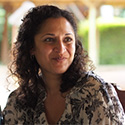 Posted November 23, 2015 WASHINGTON, DC—We are deeply saddened to confirm the tragic loss of our friend and colleague Anita Datar, who was killed during the attack on the Radisson Blu Hotel in Bamako, Mali on November 20, 2015. Ms Datar was in Mali along with two colleagues, both of whom were safely evacuated from the hotel. Ms Datar had spent more than a decade pursuing global public health, specifically reproductive health and HIV. Most recently, she was the Senior Director for Field Programs for HP+, a USAID-funded health policy project focused on improving reproductive health in developing countries. She will be remembered as a dedicated humanitarian and a trusted and beloved colleague.
Posted November 23, 2015 WASHINGTON, DC—We are deeply saddened to confirm the tragic loss of our friend and colleague Anita Datar, who was killed during the attack on the Radisson Blu Hotel in Bamako, Mali on November 20, 2015. Ms Datar was in Mali along with two colleagues, both of whom were safely evacuated from the hotel. Ms Datar had spent more than a decade pursuing global public health, specifically reproductive health and HIV. Most recently, she was the Senior Director for Field Programs for HP+, a USAID-funded health policy project focused on improving reproductive health in developing countries. She will be remembered as a dedicated humanitarian and a trusted and beloved colleague.
[ more ]- HEPP Work with Civil Society Leads to Regulatory Changes in Public Sector Procurement of Essential Commodities
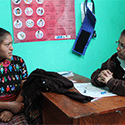 Posted November 22, 2015 WASHINGTON, DC—The approval of financial regulations aimed to increased transparency in Guatemala in 2008 prevented the Ministry of Health and Social Assistance (MSPAS) from procuring essential commodities, such as vaccines, ARVs, contraceptives, micronutrients, and surgical supplies, from cost-saving international sources. These regulations forced the ministry to pay up to 300% more for commodities of lesser quality for two years. Based on work started in 2010, the HEPP-supported reproductive health watchdog (OSAR) and National Contraceptive Security Commission (CNAA) successfully advocated for annual interim exceptions to these regulations from 2011 through 2014.
Posted November 22, 2015 WASHINGTON, DC—The approval of financial regulations aimed to increased transparency in Guatemala in 2008 prevented the Ministry of Health and Social Assistance (MSPAS) from procuring essential commodities, such as vaccines, ARVs, contraceptives, micronutrients, and surgical supplies, from cost-saving international sources. These regulations forced the ministry to pay up to 300% more for commodities of lesser quality for two years. Based on work started in 2010, the HEPP-supported reproductive health watchdog (OSAR) and National Contraceptive Security Commission (CNAA) successfully advocated for annual interim exceptions to these regulations from 2011 through 2014.
[ more ]- Something to Build On: “Innovation Exchange” Celebrates the Health Policy Project’s Close and a New Beginning
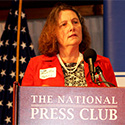 Posted November 11, 2015 WASHINGTON, DC—The USAID- and PEPFAR-funded Health Policy Project (HPP) held an “Innovation Exchange” on October 23 to mark the project’s conclusion, and to share results from the five-year effort to improve health systems in developing countries. The event brought more than 150 people to the National Press Club to hear from global health experts at USAID, HPP, the U.S. Department of State, the health ministries of Kenya and Tanzania, the World Bank, the Center for Strategic and International Studies, and various nongovernmental organizations and partners.
Posted November 11, 2015 WASHINGTON, DC—The USAID- and PEPFAR-funded Health Policy Project (HPP) held an “Innovation Exchange” on October 23 to mark the project’s conclusion, and to share results from the five-year effort to improve health systems in developing countries. The event brought more than 150 people to the National Press Club to hear from global health experts at USAID, HPP, the U.S. Department of State, the health ministries of Kenya and Tanzania, the World Bank, the Center for Strategic and International Studies, and various nongovernmental organizations and partners.
[ more ]- Government of Ghana Launches the Ghana Family Planning Costed Implementation Plan, 2016–2020
 Posted October 2, 2015 Ghana’s Ministry of Health launched the Ghana Family Planning Costed Implementation Plan, 2016–2020 (GFPCIP) on September 29, 2015 in front a crowd of 200 people. Full implementation of the GFPCIP will increase the number of women in Ghana currently using modern contraception from approximately 1.5 million in 2015 (baseline) to 1.9 million in 2020. The total cost of fully implementing the GFPCIP, including both activity and contraceptive commodity and consumable costs from 2016–2020, is US$235 million (906 million Ghanaian cedis).
Posted October 2, 2015 Ghana’s Ministry of Health launched the Ghana Family Planning Costed Implementation Plan, 2016–2020 (GFPCIP) on September 29, 2015 in front a crowd of 200 people. Full implementation of the GFPCIP will increase the number of women in Ghana currently using modern contraception from approximately 1.5 million in 2015 (baseline) to 1.9 million in 2020. The total cost of fully implementing the GFPCIP, including both activity and contraceptive commodity and consumable costs from 2016–2020, is US$235 million (906 million Ghanaian cedis).
[ more ]- HPP AKSE Celebrates Advances for Women and Girls’ Rights at End-of-Project Event
 Posted September 17, 2015 On Thursday September 10, 2015, the Health Policy Project Haiti, HPP AKSE, hosted an event marking the completion of its successful 18-month project focused on protecting the rights of children, women, and girls. HPP AKSE worked to strengthen human rights, child protection, prevention of gender-based violence and violence against women, and aimed to build local magistrates’ capacity to enforce newly enacted laws for protection.
Posted September 17, 2015 On Thursday September 10, 2015, the Health Policy Project Haiti, HPP AKSE, hosted an event marking the completion of its successful 18-month project focused on protecting the rights of children, women, and girls. HPP AKSE worked to strengthen human rights, child protection, prevention of gender-based violence and violence against women, and aimed to build local magistrates’ capacity to enforce newly enacted laws for protection.
[ more ]- HPP Builds Health System Capacity for Improved Policy, Governance and Financing in Zambia
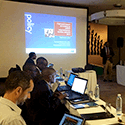 Posted September 16, 2015 LUSAKA, Zambia—On September 9, 2015, the USAID-funded Health Policy Project convened a half-day workshop entitled, “Building Health System Capacity for Improved Policy, Governance and Financing,” at the Intercontinental Hotel in Lusaka. More than 30 people attended the event, including representatives from the Ministry of Community Development, Mother and Child Health (MCDMCH), the United States Agency for International Development (USAID), the United Nations Population Fund (UNFPA), the Bill & Melinda Gates Foundation, and development partners and stakeholders.
Posted September 16, 2015 LUSAKA, Zambia—On September 9, 2015, the USAID-funded Health Policy Project convened a half-day workshop entitled, “Building Health System Capacity for Improved Policy, Governance and Financing,” at the Intercontinental Hotel in Lusaka. More than 30 people attended the event, including representatives from the Ministry of Community Development, Mother and Child Health (MCDMCH), the United States Agency for International Development (USAID), the United Nations Population Fund (UNFPA), the Bill & Melinda Gates Foundation, and development partners and stakeholders.
[ more ]- Government of Malawi Launches the Malawi Family Planning Costed Implementation Plan, 2016–2020
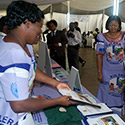 Posted September 16, 2015 ILONGWE, Malawi—Malawi’s Ministry of Health launched the Malawi Family Planning Costed Implementation Plan, 2016–2020 (FP CIP) on September 15, 2015 in front of a crowd of over 100 people. Full implementation of the FP CIP could result in an increase in the modern contraceptive rate from 33 percent to 60 percent by 2020. Full implementation of the plan is also expected to avert about 2.2 million unintended pregnancies. The total cost of the plan is US$94.6 million between 2016 and 2020.
Posted September 16, 2015 ILONGWE, Malawi—Malawi’s Ministry of Health launched the Malawi Family Planning Costed Implementation Plan, 2016–2020 (FP CIP) on September 15, 2015 in front of a crowd of over 100 people. Full implementation of the FP CIP could result in an increase in the modern contraceptive rate from 33 percent to 60 percent by 2020. Full implementation of the plan is also expected to avert about 2.2 million unintended pregnancies. The total cost of the plan is US$94.6 million between 2016 and 2020.
[ more ]- Policy Tools and Approaches for Advancing Gender Equality: HPP Experiences and Lessons Learned
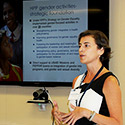 Posted September 15, 2015 WASHINGTON, DC—On Thursday, September 10, the Health Policy Project (HPP) gender team hosted an interactive end-of-project event at the USAID Global Health Bureau office in Crystal City, Virginia. “Policy Tools and Approaches for Advancing Gender Equality: HPP Experiences and Lessons Learned,” offered an opportunity to examine methods developed and applied under HPP for promoting gender equality in family planning, HIV, maternal and child health, and gender-based violence policies and programs.
Posted September 15, 2015 WASHINGTON, DC—On Thursday, September 10, the Health Policy Project (HPP) gender team hosted an interactive end-of-project event at the USAID Global Health Bureau office in Crystal City, Virginia. “Policy Tools and Approaches for Advancing Gender Equality: HPP Experiences and Lessons Learned,” offered an opportunity to examine methods developed and applied under HPP for promoting gender equality in family planning, HIV, maternal and child health, and gender-based violence policies and programs.
[ more ]- Stigma Reduction—Moving from Understanding to Outcomes
 Posted September 4, 2015 On September 2, 2015, the USAID- and PEPFAR-funded Health Policy Project (HPP) Caribbean Regional team convened a full-day end-of-project knowledge-sharing forum, “Stigma Reduction—Moving from Understanding to Outcomes” The forum provided an opportunity to discuss regional and national impact of the HPP and Pan Caribbean Partnership on HIV/AIDS (PANCAP)-implemented program to reduce stigma and discrimination against people living with HIV and key populations.
Posted September 4, 2015 On September 2, 2015, the USAID- and PEPFAR-funded Health Policy Project (HPP) Caribbean Regional team convened a full-day end-of-project knowledge-sharing forum, “Stigma Reduction—Moving from Understanding to Outcomes” The forum provided an opportunity to discuss regional and national impact of the HPP and Pan Caribbean Partnership on HIV/AIDS (PANCAP)-implemented program to reduce stigma and discrimination against people living with HIV and key populations.
[ more ]- Health Policy Project Exchange: Systems Strengthening For Improved Sexual and Reproductive Health Outcomes
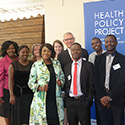 Posted August 13, 2015 LILONGWE, Malawi—The Health Policy Project, funded by the United States Agency for International Development (USAID) and the U. S. President’s Emergency Plan for AIDS Relief (PEPFAR), celebrated its project’s work at an event, “Health Policy Project Exchange: Systems Strengthening for Improved Sexual and Reproductive Health Outcomes” on August 11 at the Capital Sunbird Hotel.
Posted August 13, 2015 LILONGWE, Malawi—The Health Policy Project, funded by the United States Agency for International Development (USAID) and the U. S. President’s Emergency Plan for AIDS Relief (PEPFAR), celebrated its project’s work at an event, “Health Policy Project Exchange: Systems Strengthening for Improved Sexual and Reproductive Health Outcomes” on August 11 at the Capital Sunbird Hotel.
[ more ]- HPP Nigeria Celebrates Five Years of Progress in Family Planning
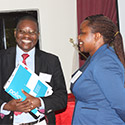 Posted August 7, 2015 ABUJA, Nigeria—On July 23, 2015, the USAID-funded Health Policy Project (HPP)/Nigeria convened a half-day knowledge-sharing forum entitled, “Evidence for Family Planning: Strengthening Advocacy, Decision Making, and Accountability in Nigeria.” Celebrating five years of work, the forum served as an opportunity to highlight partner accomplishments in evidence creation and use, and to articulate a way forward for family planning (FP) policy, programs, and funding in Nigeria. More than 70 FP stakeholders attended the forum.
Posted August 7, 2015 ABUJA, Nigeria—On July 23, 2015, the USAID-funded Health Policy Project (HPP)/Nigeria convened a half-day knowledge-sharing forum entitled, “Evidence for Family Planning: Strengthening Advocacy, Decision Making, and Accountability in Nigeria.” Celebrating five years of work, the forum served as an opportunity to highlight partner accomplishments in evidence creation and use, and to articulate a way forward for family planning (FP) policy, programs, and funding in Nigeria. More than 70 FP stakeholders attended the forum.
[ more ]- Celebrating Lasting Change in West Africa: Knowledge Sharing Event
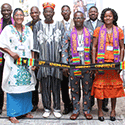 Posted August 3, 2015—The USAID- and PEPFAR-funded Health Policy Project (HPP) celebrated the project’s achievements at a two-day knowledge sharing event in Accra, Ghana, on July 21 and 22, 2015. Special guests were present from USAID/West Africa, Ghana’s Ministry of Health, the West African Health Organization (WAHO), and other implementing partners.
Posted August 3, 2015—The USAID- and PEPFAR-funded Health Policy Project (HPP) celebrated the project’s achievements at a two-day knowledge sharing event in Accra, Ghana, on July 21 and 22, 2015. Special guests were present from USAID/West Africa, Ghana’s Ministry of Health, the West African Health Organization (WAHO), and other implementing partners.
[ more ]- HPP Holds Webinar on Geographic Approaches to HIV Programming
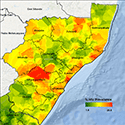 Posted August 3, 2015—The USAID and PEPFAR-funded Health Policy Project (HPP) organized a webinar on July 29, entitled Taking a Geographic Approach to HIV Programming: Lessons Learned in Implementation and Navigating the Way Forward. The interactive session brought together panelists from the US Agency for International Development (USAID), the Office of the Global AIDS Coordinator (OGAC), the Global Fund to Fight HIV/AIDS, Tuberculosis, and Malaria (the Global Fund), and the South Africa National AIDS Council (SANAC).
Posted August 3, 2015—The USAID and PEPFAR-funded Health Policy Project (HPP) organized a webinar on July 29, entitled Taking a Geographic Approach to HIV Programming: Lessons Learned in Implementation and Navigating the Way Forward. The interactive session brought together panelists from the US Agency for International Development (USAID), the Office of the Global AIDS Coordinator (OGAC), the Global Fund to Fight HIV/AIDS, Tuberculosis, and Malaria (the Global Fund), and the South Africa National AIDS Council (SANAC).
[ more ]- Health Policy Project Helps Generate US$30 Million for Strategic Health Commodities Including ARVs in Kenya
.jpg) Posted July 30, 2015—The USAID- and PEPFAR-funded Health Policy Project (HPP) in Kenya helped the Ministry of Health (MOH) secure an allocation of KSh 2.9 billion (approximately US$30 million) in the 2015/16 national budget to purchase HIV commodities and other strategic health commodities. Of this, US$21 to 23 million will go to purchase antiretroviral drugs (ARVs) and HIV testing kits. The remainder will supplement the purchase of malaria and tuberculosis commodities. HPP also helped secure the reinstatement of a line item for an annual allocation for HIV commodities in future national budgets.
Posted July 30, 2015—The USAID- and PEPFAR-funded Health Policy Project (HPP) in Kenya helped the Ministry of Health (MOH) secure an allocation of KSh 2.9 billion (approximately US$30 million) in the 2015/16 national budget to purchase HIV commodities and other strategic health commodities. Of this, US$21 to 23 million will go to purchase antiretroviral drugs (ARVs) and HIV testing kits. The remainder will supplement the purchase of malaria and tuberculosis commodities. HPP also helped secure the reinstatement of a line item for an annual allocation for HIV commodities in future national budgets.
[ more ]- Financing Health in the Post-2015 Era: Filling Gaps for Sustained Impact
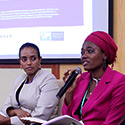 Posted July 17, 2015 ADDIS ABABA, Ethiopia—Most pregnant women in Tanzania risk losing their lives and babies due to lack of skilled labour, the Global Forum on Financing for Development was told yesterday. Health Policy Project (HPP) Director Suneeta Sharma was addressing a session on health financing in the post-2015 era whose theme was: ‘Filling the Gaps for Sustainable Impact.’
Posted July 17, 2015 ADDIS ABABA, Ethiopia—Most pregnant women in Tanzania risk losing their lives and babies due to lack of skilled labour, the Global Forum on Financing for Development was told yesterday. Health Policy Project (HPP) Director Suneeta Sharma was addressing a session on health financing in the post-2015 era whose theme was: ‘Filling the Gaps for Sustainable Impact.’
[ more ]- Decentralization in Health Care: Diffusion or Confusion?
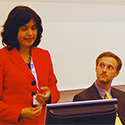 Posted July 16, 2015 MILAN, Italy—Decentralization is changing health systems. By bringing decision making closer to citizens, experts believe that governments will be more responsive and accountable to their populations. In an International Health Economics Association satellite session on July 12, the Health Policy Project (HPP), funded by USAID, presented new ways of thinking about why and how decentralization occurs. “Decentralization in Health Care: Diffusion or Confusion?” brought together panelists from HPP’s headquarters in Washington and the HPP Kenya office with a crowd of 50 representatives of multiple sectors, including participants from the World Bank, national ministries of health, and academia.
Posted July 16, 2015 MILAN, Italy—Decentralization is changing health systems. By bringing decision making closer to citizens, experts believe that governments will be more responsive and accountable to their populations. In an International Health Economics Association satellite session on July 12, the Health Policy Project (HPP), funded by USAID, presented new ways of thinking about why and how decentralization occurs. “Decentralization in Health Care: Diffusion or Confusion?” brought together panelists from HPP’s headquarters in Washington and the HPP Kenya office with a crowd of 50 representatives of multiple sectors, including participants from the World Bank, national ministries of health, and academia.
[ more ]- Innovation Exchange: End-of-Project Event for Health Policy Project Jamaica
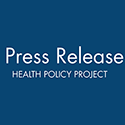 Posted July 15, 2015 KINGSTON, Jamaica—The Health Policy Project , funded by the United States Agency for International Development (USAID) and the U. S. President’s Emergency Plan for AIDS Relief (PEPFAR), celebrated its end-of-project event, “Innovation Exchange: End-of-Project Event for Health Policy Project Jamaica” on July 14 at the Pegasus Hotel.
Posted July 15, 2015 KINGSTON, Jamaica—The Health Policy Project , funded by the United States Agency for International Development (USAID) and the U. S. President’s Emergency Plan for AIDS Relief (PEPFAR), celebrated its end-of-project event, “Innovation Exchange: End-of-Project Event for Health Policy Project Jamaica” on July 14 at the Pegasus Hotel.
[ more ]- Upping Our Game for Family Planning
 Posted July 10, 2015 WASHINGTON, DC—When Monica Kerrigan, senior advisor to Family Planning 2020 (FP2020), opened a forum on global family planning (FP) convened by the USAID-funded Health Policy Project (HPP), she brought news of “tremendous progress” but also of the urgent need to “up our game.” The forum, entitled “Commitment to Action: Enabling Fulfillment of Family Planning Goals,” was held July 7 at HPP’s headquarters, in Washington, DC.
Posted July 10, 2015 WASHINGTON, DC—When Monica Kerrigan, senior advisor to Family Planning 2020 (FP2020), opened a forum on global family planning (FP) convened by the USAID-funded Health Policy Project (HPP), she brought news of “tremendous progress” but also of the urgent need to “up our game.” The forum, entitled “Commitment to Action: Enabling Fulfillment of Family Planning Goals,” was held July 7 at HPP’s headquarters, in Washington, DC.
[ more ]- Afghanistan Ministry of Public Health Launches the Health Economics Exchange Forum
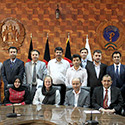 Posted June 18, 2015 On June 16, 2015, the Afghanistan’s Ministry of Public Health launched the Health Economics Exchange Forum (HEEF). HEEF is an online forum aimed at knowledge sharing across Afghanistan, Central Asia, and the Eastern Mediterranean region, set up by the Health Economics and Finance Directorate (HEFD) with the support of the USAID-funded Health Policy Project (HPP)/Afghanistan. The launch event was attended by representatives from the Ministry of Public Health, donor community, implementing partners, and nongovernmental organizations (NGOs).
Posted June 18, 2015 On June 16, 2015, the Afghanistan’s Ministry of Public Health launched the Health Economics Exchange Forum (HEEF). HEEF is an online forum aimed at knowledge sharing across Afghanistan, Central Asia, and the Eastern Mediterranean region, set up by the Health Economics and Finance Directorate (HEFD) with the support of the USAID-funded Health Policy Project (HPP)/Afghanistan. The launch event was attended by representatives from the Ministry of Public Health, donor community, implementing partners, and nongovernmental organizations (NGOs).
[ more ]- “Moving from Understanding to Collective Action”: Global Progress on Preventing Stigma and Discrimination
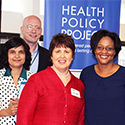 Posted June 16, 2015 WASHINGTON, DC—“How do we take all that we have learned about stigma and discrimination over the past 30 years and integrate it in everything we do about HIV—as a core function, not a luxury?” With this question, Laura Nyblade articulated the agenda of an expert consultation on “Breaking Barriers: Scaling Up HIV Stigma Reduction in Health Facilities.” Ms. Nyblade is senior technical advisor on stigma and discrimination (S&D) at the Research Triangle Institute International and the USAID- and PEPFAR-funded Health Policy Project (HPP), which hosted the event on June 3 at its offices.
Posted June 16, 2015 WASHINGTON, DC—“How do we take all that we have learned about stigma and discrimination over the past 30 years and integrate it in everything we do about HIV—as a core function, not a luxury?” With this question, Laura Nyblade articulated the agenda of an expert consultation on “Breaking Barriers: Scaling Up HIV Stigma Reduction in Health Facilities.” Ms. Nyblade is senior technical advisor on stigma and discrimination (S&D) at the Research Triangle Institute International and the USAID- and PEPFAR-funded Health Policy Project (HPP), which hosted the event on June 3 at its offices.
[ more ]- In Kenya: Health Expenditure Up, Donor Funding Down
_thumb.jpg) Posted June 10, 2015 NAIROBI, Kenya—According to a new report released this week by Kenya’s Ministry of Health, the country’s total health expenditure has risen significantly over the past several years, from KSh 163 billion (US$2,155 million) in 2009/10 to KSh 234 billion (US$2,743 million) in 2012/13, representing 6.8 percent of the country’s gross domestic product.1 At the same time, contributions to the health sector by development partners fell (from 35% in 2009/10 to 26% in 2012/13), signifying the first-ever decline in donor funding for Kenya’s health sector.
Posted June 10, 2015 NAIROBI, Kenya—According to a new report released this week by Kenya’s Ministry of Health, the country’s total health expenditure has risen significantly over the past several years, from KSh 163 billion (US$2,155 million) in 2009/10 to KSh 234 billion (US$2,743 million) in 2012/13, representing 6.8 percent of the country’s gross domestic product.1 At the same time, contributions to the health sector by development partners fell (from 35% in 2009/10 to 26% in 2012/13), signifying the first-ever decline in donor funding for Kenya’s health sector.
[ more ]- Kenya Releases First Health Survey to Capture County-Level Data; Explores a Decade of Health Care Utilization and Costs
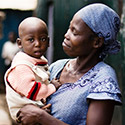 Posted June 9, 2015 NAIROBI, Kenya—In 2003 and 2007, Kenya conducted Household Health Expenditure and Utilization Surveys (KHHEUS) to explore how health services are both used and paid for. The surveys provided important information on citizen’s health seeking behaviors and helped to accelerate important changes to the country’s health sector. Most notably, survey results were instrumental in the creation of a policy to reduce user fees at the country’s health centers and dispensaries. Now, the government of Kenya has released a third KHHEUS that analyzes data captured in 2013.
Posted June 9, 2015 NAIROBI, Kenya—In 2003 and 2007, Kenya conducted Household Health Expenditure and Utilization Surveys (KHHEUS) to explore how health services are both used and paid for. The surveys provided important information on citizen’s health seeking behaviors and helped to accelerate important changes to the country’s health sector. Most notably, survey results were instrumental in the creation of a policy to reduce user fees at the country’s health centers and dispensaries. Now, the government of Kenya has released a third KHHEUS that analyzes data captured in 2013.
[ more ]- HPP/Afghanistan Celebrates Three Years of Health Sector Progress
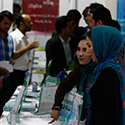 Posted June 4, 2015 KABUL, Afghanistan—On June 2, 2015, the USAID-funded Health Policy Project (HPP)/Afghanistan conducted a symposium at the Ministry of Public Health. This event was an opportunity for the project to share its milestones with a diverse set of stakeholders representing government, civil society, business, and donor agencies and organizations. Ahmad Jan Naeem, M.D., the Deputy Minister for Policy and Planning, opened the symposium with an appreciation of HPP/Afghanistan’s collaboration with the health ministry since 2012.
Posted June 4, 2015 KABUL, Afghanistan—On June 2, 2015, the USAID-funded Health Policy Project (HPP)/Afghanistan conducted a symposium at the Ministry of Public Health. This event was an opportunity for the project to share its milestones with a diverse set of stakeholders representing government, civil society, business, and donor agencies and organizations. Ahmad Jan Naeem, M.D., the Deputy Minister for Policy and Planning, opened the symposium with an appreciation of HPP/Afghanistan’s collaboration with the health ministry since 2012.
[ more ]- HPP Supports KEMSA to Disseminate its Strategic Plan
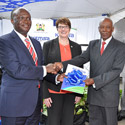 Posted June 3, 2015 NAIROBI, Kenya—The USAID-funded Health Policy Project (HPP) recently supported the Kenya Medical Supplies Authority (KEMSA) to develop its five-year strategic plan, launched in Nairobi at the end of May. The strategic plan lays out the agency’s new business approach that will enable it to meet the needs of Kenya’s devolved health system..
Posted June 3, 2015 NAIROBI, Kenya—The USAID-funded Health Policy Project (HPP) recently supported the Kenya Medical Supplies Authority (KEMSA) to develop its five-year strategic plan, launched in Nairobi at the end of May. The strategic plan lays out the agency’s new business approach that will enable it to meet the needs of Kenya’s devolved health system..
[ more ]- HIV in West and Central Africa: Research Shifts Policy’s Focus to Key Populations
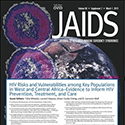 Posted May 27, 2015 WASHINGTON, DC—The dimensions of HIV transmission among some populations key to the epidemic in West and Central Africa—sex workers (SWs); men who have sex with men (MSM); people who inject drugs; and transgender people—have been largely unmapped and under-addressed. In recent years, though, a number of studies have drawn attention to these populations in the region. An online seminar hosted by the USAID- and PEPFAR-funded Health Policy Project (HPP) presented findings from three such studies published in JAIDS: Journal of Acquired Immune Deficiency Syndromes—along with 20 others—in a special JAIDS supplement this past March.
Posted May 27, 2015 WASHINGTON, DC—The dimensions of HIV transmission among some populations key to the epidemic in West and Central Africa—sex workers (SWs); men who have sex with men (MSM); people who inject drugs; and transgender people—have been largely unmapped and under-addressed. In recent years, though, a number of studies have drawn attention to these populations in the region. An online seminar hosted by the USAID- and PEPFAR-funded Health Policy Project (HPP) presented findings from three such studies published in JAIDS: Journal of Acquired Immune Deficiency Syndromes—along with 20 others—in a special JAIDS supplement this past March.
[ more ]- Sustaining the Benefits of Capacity Development for Health Policy in India
 Posted May 15, 2015 NEW DELHI, India—The USAID- and PEPFAR-funded Health Policy Project (HPP)/India held a symposium in New Delhi on May 12, 2015. The event brought 25 representatives from state governments, academic/research institutions, nongovernmental organizations, and civil society organizations together with a distinguished group of speakers to discuss HPP/India’s work since 2011—particularly in the states of Uttarakhand, Jharkhand, and Uttar Pradesh. The presentations summarized project experiences, achievements, and lessons learned, as well as strategies for policy stewardship and systems strengthening going forward.
Posted May 15, 2015 NEW DELHI, India—The USAID- and PEPFAR-funded Health Policy Project (HPP)/India held a symposium in New Delhi on May 12, 2015. The event brought 25 representatives from state governments, academic/research institutions, nongovernmental organizations, and civil society organizations together with a distinguished group of speakers to discuss HPP/India’s work since 2011—particularly in the states of Uttarakhand, Jharkhand, and Uttar Pradesh. The presentations summarized project experiences, achievements, and lessons learned, as well as strategies for policy stewardship and systems strengthening going forward.
[ more ]- ImpactNow launched in Kenya
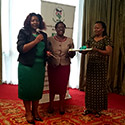 Posted May 14, 2015 WASHINGTON, DC—This week, the Kenya National Council for Population and Development (NCPD) launched a new model which helps make the case for national and county government investment in family planning (FP). The model, termed ImpactNow, was developed by the USAID-funded Health Policy Project (HPP) and demonstrates how investments made in FP programs lead to health and economic benefits for a country and its people. It is designed to help policy advocates make the case to decisionmakers for investing in FP by demonstrating the near-term (2–7 years) benefits of doing so.
Posted May 14, 2015 WASHINGTON, DC—This week, the Kenya National Council for Population and Development (NCPD) launched a new model which helps make the case for national and county government investment in family planning (FP). The model, termed ImpactNow, was developed by the USAID-funded Health Policy Project (HPP) and demonstrates how investments made in FP programs lead to health and economic benefits for a country and its people. It is designed to help policy advocates make the case to decisionmakers for investing in FP by demonstrating the near-term (2–7 years) benefits of doing so.
[ more ]- Turning to the Unfinished Business of Maternal and Child Health
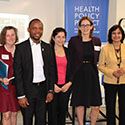 Posted May 12, 2015 WASHINGTON, DC—The U.S. Agency for International Development (USAID) has pledged to end preventable maternal mortality by 2035. On May 7, the USAID-funded Health Policy Project (HPP) held a forum titled “Making the Case for Mothers: Improving Lives through Policy” to explore the central roles of global leadership, local partnerships, financing, and evidence-informed policy and advocacy in achieving this ambitious goal. More than 100 members of the international development community, policymakers, and representatives of think tanks and donor organizations attended the session at HPP’s Futures Group headquarters or participated online.
Posted May 12, 2015 WASHINGTON, DC—The U.S. Agency for International Development (USAID) has pledged to end preventable maternal mortality by 2035. On May 7, the USAID-funded Health Policy Project (HPP) held a forum titled “Making the Case for Mothers: Improving Lives through Policy” to explore the central roles of global leadership, local partnerships, financing, and evidence-informed policy and advocacy in achieving this ambitious goal. More than 100 members of the international development community, policymakers, and representatives of think tanks and donor organizations attended the session at HPP’s Futures Group headquarters or participated online.
[ more ]- Linking the Intangibles of Capacity Development to Real-World Change
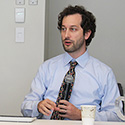 Posted May 12, 2015 WASHINGTON, DC—An online seminar yesterday covered this and other issues complicating the pursuit of capacity development by the global health community. “Capacity Development: Where Is It Heading? Practical Insights for Improving Global Health Outcomes” was convened by the Health Policy Project (HPP)—funded by the U.S. Agency for International Development (USAID) and the U.S. President’s Emergency Plan for AIDS Relief (PEPFAR)—as one of many knowledge-sharing activities scheduled from now to September 22, when the project will end
Posted May 12, 2015 WASHINGTON, DC—An online seminar yesterday covered this and other issues complicating the pursuit of capacity development by the global health community. “Capacity Development: Where Is It Heading? Practical Insights for Improving Global Health Outcomes” was convened by the Health Policy Project (HPP)—funded by the U.S. Agency for International Development (USAID) and the U.S. President’s Emergency Plan for AIDS Relief (PEPFAR)—as one of many knowledge-sharing activities scheduled from now to September 22, when the project will end
[ more ]- Strengthening Health Governance for Human Rights
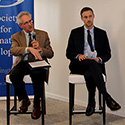 Posted April 24, 2015 WASHINGTON, DC—Translating the “right to the highest attainable standard of health”—affirmed and protected by many international agreements—into actionable policies has met significant challenges in many countries. The Washington, DC chapter of the Society for International Development convened a forum titled “Strengthening Health Governance for Human Rights” to explore this topic, both conceptually and through practical examples from the field.
Posted April 24, 2015 WASHINGTON, DC—Translating the “right to the highest attainable standard of health”—affirmed and protected by many international agreements—into actionable policies has met significant challenges in many countries. The Washington, DC chapter of the Society for International Development convened a forum titled “Strengthening Health Governance for Human Rights” to explore this topic, both conceptually and through practical examples from the field.
[ more ]- Health Policy Project Supports Meeting to Review Progress in Devolution in Kenya
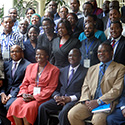 Posted April 13, 2015 NAIROBI, Kenya—The USAID-and PEPFAR-funded Health Policy Project (HPP) supported a meeting in Kenya this week to review the achievements and progress made in devolution of health services. The health sector inter-governmental consultative forum (HSICF) brought together leaders from the national government (Ministry of Health) and county government officials responsible for health services, constitutional offices, and other relevant stakeholders.
Posted April 13, 2015 NAIROBI, Kenya—The USAID-and PEPFAR-funded Health Policy Project (HPP) supported a meeting in Kenya this week to review the achievements and progress made in devolution of health services. The health sector inter-governmental consultative forum (HSICF) brought together leaders from the national government (Ministry of Health) and county government officials responsible for health services, constitutional offices, and other relevant stakeholders.
[ more ]- Healthcare Costs Continue to Impoverish Millions of Kenyans
_thumb.jpg) Posted April 8, 2015 NAIROBI, Kenya—A new report, Catastrophic Health Expenditures and Impoverishment in Kenya, shows that healthcare costs push millions of Kenyans below the poverty line each year and further impoverish many more. Catastrophic health expenditures refer to healthcare spending that is high relative to a household’s budget or its capacity to pay. These costs can be financially disastrous, especially for poor households, and annually push an additional 1.48 million Kenyans into poverty (see Healthcare Financing Options for Kenya: FY 2013/14–2029/30).
Posted April 8, 2015 NAIROBI, Kenya—A new report, Catastrophic Health Expenditures and Impoverishment in Kenya, shows that healthcare costs push millions of Kenyans below the poverty line each year and further impoverish many more. Catastrophic health expenditures refer to healthcare spending that is high relative to a household’s budget or its capacity to pay. These costs can be financially disastrous, especially for poor households, and annually push an additional 1.48 million Kenyans into poverty (see Healthcare Financing Options for Kenya: FY 2013/14–2029/30).
[ more ]- Transforming Afghanistan’s Health System
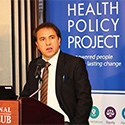 Posted April 6, 2015 WASHINGTON, DC—Afghanistan has declared 2015–2024 its “Decade of Transformation.” On April 2, the USAID-funded Health Policy Project (HPP) convened a forum of distinguished speakers at the National Press Club to discuss where the country’s health system stands now and the progress that’s envisioned in the years to come.
Posted April 6, 2015 WASHINGTON, DC—Afghanistan has declared 2015–2024 its “Decade of Transformation.” On April 2, the USAID-funded Health Policy Project (HPP) convened a forum of distinguished speakers at the National Press Club to discuss where the country’s health system stands now and the progress that’s envisioned in the years to come.
[ more ]- Report Details Financing Options to Protect Citizens from Catastrophic Healthcare Costs
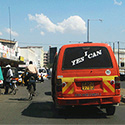 Posted March 27, 2015 NAIROBI, Kenya— As Kenya moves toward middle-income country status and away from a donor-dependent healthcare system, the country needs to explore alternative and sustainable health financing mechanisms. Sustainable healthcare financing would allow the country to expand and ensure widespread access to healthcare services and meet its development goals while protecting its citizens from devastating healthcare costs. In a recently released report, the USAID- and PEPFAR-supported Health Policy Project (HPP) presents the range of long-term, sustainable financing options available for healthcare in Kenya over the next 15 years.
Posted March 27, 2015 NAIROBI, Kenya— As Kenya moves toward middle-income country status and away from a donor-dependent healthcare system, the country needs to explore alternative and sustainable health financing mechanisms. Sustainable healthcare financing would allow the country to expand and ensure widespread access to healthcare services and meet its development goals while protecting its citizens from devastating healthcare costs. In a recently released report, the USAID- and PEPFAR-supported Health Policy Project (HPP) presents the range of long-term, sustainable financing options available for healthcare in Kenya over the next 15 years.
[ more ]- New Costed Implementation Plan Resource Kit Launched
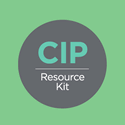 Posted March 26, 2015 Istanbul, Turkey— FP2020 used its Focal Point Workshop, held in Istanbul, Turkey from March 24–25, to launch the Costed Implementation Plan (CIP) Resource Kit as part of its new knowledge platform. Acknowledging the critical role of CIPs in transforming ambitious family planning commitments into concrete programs and policies, FP2020, USAID, and UNFPA jointly developed the resource kit in collaboration with the USAID-funded Health Policy Project (HPP) and the Knowledge for Health Project (who developed new tools for the resource kit and curated existing relevant resources). The new tools were inspired by the hands-on experience of governments, donors, and technical assistance providers who have collectively developed more than 15 CIPs.
Posted March 26, 2015 Istanbul, Turkey— FP2020 used its Focal Point Workshop, held in Istanbul, Turkey from March 24–25, to launch the Costed Implementation Plan (CIP) Resource Kit as part of its new knowledge platform. Acknowledging the critical role of CIPs in transforming ambitious family planning commitments into concrete programs and policies, FP2020, USAID, and UNFPA jointly developed the resource kit in collaboration with the USAID-funded Health Policy Project (HPP) and the Knowledge for Health Project (who developed new tools for the resource kit and curated existing relevant resources). The new tools were inspired by the hands-on experience of governments, donors, and technical assistance providers who have collectively developed more than 15 CIPs.
[ more ]- "To Break the Wall": HPP's Evidence-Informed Models Make the Case for Family Planning
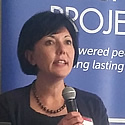 Posted March 26, 2015 WASHINGTON, DC—Models demonstrating the impact of demographic and health changes on policy goals transform national debates about health funding in developing countries, according to experts gathered by the USAID-funded Health Policy Project (HPP). Speaking at HPP's DC office on March 24 to representatives of international development agencies, research organizations, and other partners, the group explained how HPP 's policy models—informed by country-specific data and aligned with national goals—allow advocates to show how voluntary family planning saves lives and money.
Posted March 26, 2015 WASHINGTON, DC—Models demonstrating the impact of demographic and health changes on policy goals transform national debates about health funding in developing countries, according to experts gathered by the USAID-funded Health Policy Project (HPP). Speaking at HPP's DC office on March 24 to representatives of international development agencies, research organizations, and other partners, the group explained how HPP 's policy models—informed by country-specific data and aligned with national goals—allow advocates to show how voluntary family planning saves lives and money.
[ more ]- Moving Toward a “Grand Convergence” in the Health of Poor and Rich Countries
 Posted March 6, 2015 WASHINGTON, DC—In a 1947 musical by Alan Jay Lerner, a Scottish village—Brigadoon—comes to life once every hundred years, for just one day. Like Brigadoon, the Global Health Mini-University also comes and goes in a day, but fortunately, its recurrence is annual, not centennial. Since 2002, the Mini-University has brought professionals and students in the field of global health to Washington, DC, to hear from experts reporting the latest findings on best practices. This year’s event, on March 2, was sponsored by the U.S. Agency for International Development (USAID), the George Washington University Milken Institute School of Public Health, and the Global Health Professional and Organizational Development Program.
Posted March 6, 2015 WASHINGTON, DC—In a 1947 musical by Alan Jay Lerner, a Scottish village—Brigadoon—comes to life once every hundred years, for just one day. Like Brigadoon, the Global Health Mini-University also comes and goes in a day, but fortunately, its recurrence is annual, not centennial. Since 2002, the Mini-University has brought professionals and students in the field of global health to Washington, DC, to hear from experts reporting the latest findings on best practices. This year’s event, on March 2, was sponsored by the U.S. Agency for International Development (USAID), the George Washington University Milken Institute School of Public Health, and the Global Health Professional and Organizational Development Program.
[ more ]- HPP Supports Transgender and Hijra Consultation in Kathmandu
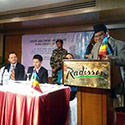 Posted February 6, 2015 KATHMANDU, Nepal—In early February, the USAID- and PEPFAR-funded Health Policy Project provided support to a three-day consultation in Kathmandu, Nepal. The event was organized by Blue Diamond Society, Asia-Pacific Transgender Network, and UNDP; UNAIDS, USAID, and PEPFAR also provided support.The meetings offered a forum for South Asian transgender and hijra (a term used in South Asia to refer to transsexual or transgender persons) stakeholders and activists to articulate their concerns and constructively engage with legislators and policymakers on creating evidence-based policies to advance health, living conditions, and overall well-being for these communities.
Posted February 6, 2015 KATHMANDU, Nepal—In early February, the USAID- and PEPFAR-funded Health Policy Project provided support to a three-day consultation in Kathmandu, Nepal. The event was organized by Blue Diamond Society, Asia-Pacific Transgender Network, and UNDP; UNAIDS, USAID, and PEPFAR also provided support.The meetings offered a forum for South Asian transgender and hijra (a term used in South Asia to refer to transsexual or transgender persons) stakeholders and activists to articulate their concerns and constructively engage with legislators and policymakers on creating evidence-based policies to advance health, living conditions, and overall well-being for these communities.
[ more ]- MPs, Donors, and Business Leaders Seek Stable Financing for Tanzania’s Health System
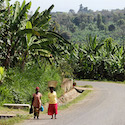 Posted February 6, 2015 DAR ES SALAAM, Tanzania—In mid-January 2015, as the Tanzanian government geared up to finalize its budget for the next fiscal year, business leaders, members of Parliament, and representatives of external donors gathered in Dar es Salaam to discuss how to mobilize more domestic resources to finance Tanzania’s health system. Currently, nearly half of the country’s health budget is covered by donor funding—the largest share in the world. Foreign funds account for 97 percent of mainland Tanzania’s budget for HIV, and 90 percent of that amount is provided by the U.S. President’s Emergency Fund for AIDS Relief (PEPFAR) and the Global Fund to Fight AIDS, Tuberculosis and Malaria (Global Fund).
Posted February 6, 2015 DAR ES SALAAM, Tanzania—In mid-January 2015, as the Tanzanian government geared up to finalize its budget for the next fiscal year, business leaders, members of Parliament, and representatives of external donors gathered in Dar es Salaam to discuss how to mobilize more domestic resources to finance Tanzania’s health system. Currently, nearly half of the country’s health budget is covered by donor funding—the largest share in the world. Foreign funds account for 97 percent of mainland Tanzania’s budget for HIV, and 90 percent of that amount is provided by the U.S. President’s Emergency Fund for AIDS Relief (PEPFAR) and the Global Fund to Fight AIDS, Tuberculosis and Malaria (Global Fund).
[ more ]- Health Policy as a Global Public Good: Development Leaders Share Their Perspectives
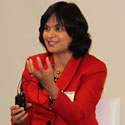 Posted January 15, 2014 Washington, DC—Global health leaders came together on the afternoon of January 13 to share their views on sustainable responses to the changing landscape of development work. The Health Policy Project (HPP), which is funded by the U.S. Agency for International Development (USAID) and the U.S. President’s Emergency Plan for AIDS Relief, convened the forum at its new Washington, DC office. More than 100 guests attended, representing diverse sectors of the global health community.
Posted January 15, 2014 Washington, DC—Global health leaders came together on the afternoon of January 13 to share their views on sustainable responses to the changing landscape of development work. The Health Policy Project (HPP), which is funded by the U.S. Agency for International Development (USAID) and the U.S. President’s Emergency Plan for AIDS Relief, convened the forum at its new Washington, DC office. More than 100 guests attended, representing diverse sectors of the global health community.
[ more ]

